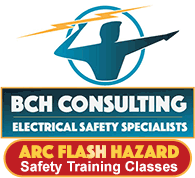One of the more common tasks for an industrial electrician is to troubleshoot energized terminal points in 120-volt control panels. When machines stop running this is usually the first place we turn to determine the problem. Although the equipment in these panels is often energized at lower voltages such as 120-volts AC this does not mean that there aren’t any electrical hazards. Shocks at low voltages can certainly cause us harm. Either directly when electrical current passes through our body or indirectly such as a shock that knocks us off a ladder, causes us to fall backward and hit our heads on a sharp or solid object, or we flinch and come in contact with higher voltage levels in the panel such as 480-volts. Keep in mind that just because the voltage is low it doesn’t mean that the hazard is low.
Doesn’t the insulated test equipment keep me safe?
Because the probes of test equipment are insulated many electrical workers rely solely on the probe for their safety. In the case of test equipment, the probes must be insulated for the voltage to which they will be applied. However, this safety practice alone may not be enough to ensure against a shock. For instance, are there other exposed energized parts that the worker’s hand could inadvertently contact during the testing? Can the worker’s hands slip off the probes and contact energized parts? If the answer is yes or maybe rubber insulating gloves would be required to be worn when performing this work
Avoid contact?
NFPA 70E ® 130.4(F)(1) states the qualified worker’s hands must be insulated or the energized parts must be guarded before they can enter the restricted approach boundary. The restricted approach distance to 120 volts is listed in NFPA 70E ® table 130.4 (D)(a) as “avoid contact”. These words mean that if work is being performed on circuits or components using insulated tools and no physical contact could be made or is likely to be made, rubber insulating gloves are not required. Ask yourself can I avoid contact without trying? In other words, can inadvertent contact with exposed energized conductors be made? If the answer is yes rubber insulating gloves need to be worn.
What does OSHA say?
In an OSHA Letter of Interpretation dated June 22, 1998, OSHA points to paragraph 1910.335(a)(1)(i) which requires employees to use appropriate electrical protective equipment (including rubber insulating gloves) when working in areas with potential electrical hazards. OSHA explains that whether an employee needs to wear rubber insulating gloves while working with test equipment on energized 120-240-volt circuits will depend on several factors:
- Whether the probes are designed so that the employee’s hand can slip off the end of the insulated handle;
- Whether there are other exposed energized parts that the employee’s hand might contact during testing.
If either of these conditions is present, the use of rubber insulating gloves or other electrical protective equipment would be warranted.
See the complete letter of interpretation here:
Click Here
[activecampaign form=3]






